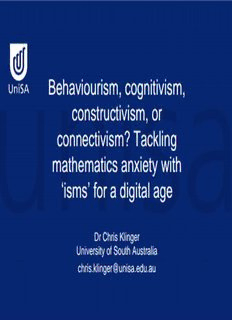
Behaviourism, cognitivism, constructivism, or connectivism - ALM PDF
Preview Behaviourism, cognitivism, constructivism, or connectivism - ALM
Behaviourism, cognitivism, constructivism, or connectivism? Tackling mathematics anxiety with ‘isms’ for a digital age Dr Chris Klinger University of South Australia [email protected] Introduction adult learners • endemic innumeracy • maths anxiety, negative attitudes, maths-aversion ‘traditional’ approaches don’t work for math-averse students Learner characteristics – the practitioner’s challenge • confusion • lack of confidence • negative perceptions • lack of strategies • narrow focus • assessment-driven motivation • little or no appreciation of the concept of mathematics as language Learning styles & teaching framework • shallow, or surface learning styles – maybe atypical • maths learning style as reaction to math- aversion i.e. not intrinsic • past learning experiences as proximal cause • need for different framework • need to understand the epistemological basis for adult maths/numeracy teaching… Epistemology and pedagogy in perspective Behaviourism • ‘skill & drill’ • focus on procedures and outcomes arranged hierarchically • mathematical knowledge is external, absolute Exposition by the teacher followed by practise of skills and techniques is a feature which most people remember when they think of how they learned mathematics. (Orton, 2004) • ‘use it or lose it’ impermanence Epistemology and pedagogy in perspective Cognitivism • intentional action from mental states • learner adapts to learning environment • recursive processes of assimilation and accommodation • internal knowledge representations or schema (Bartlett, 1932) • cognitivism augments rather than supplants behaviourist practices Epistemology and pedagogy in perspective Social cognitivism • fuses elements of behaviourism and cognitivism with social aspects of learning (Bandura, 1986) • learning is as much social as it is behavioural and cognitive • importance of observational learning – comparative observations of self & of others self-efficacy beliefs (Bandura, 1997) Epistemology and pedagogy in perspective Constructivism • knowledge cannot be transmitted but is a construct of the mind as a consequence of experiential learning o learning is an ongoing process of hypothesizing, rule-creation and reflection o no didactic authority o teacher as a facilitator of the learning process & information conduit Epistemology and pedagogy in perspective Social constructivism • knowledge must necessarily be grounded in social values, standards, mores, language and culture • social interaction extends the location of knowledge via communicated and shared understandings Epistemology and pedagogy in perspective Social constructivism • knowledge must necessarily be grounded in social values, standards, mores, language and culture • social interaction extends the location of knowledge via communicated and shared understandings Flawed, in context of mathematics & numeracy education: • required curriculum outcomes identical to those of behaviourists and cognitivists • assumptions that self-directed learners have ‘sufficient prior knowledge and skills’ (Rowe, 2006) • not reasonable or sensible to expect students to actually discover ‘basic’ mathematical concepts and corresponding procedures
Description: